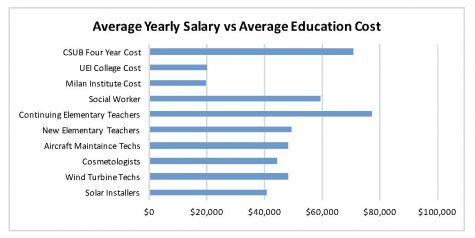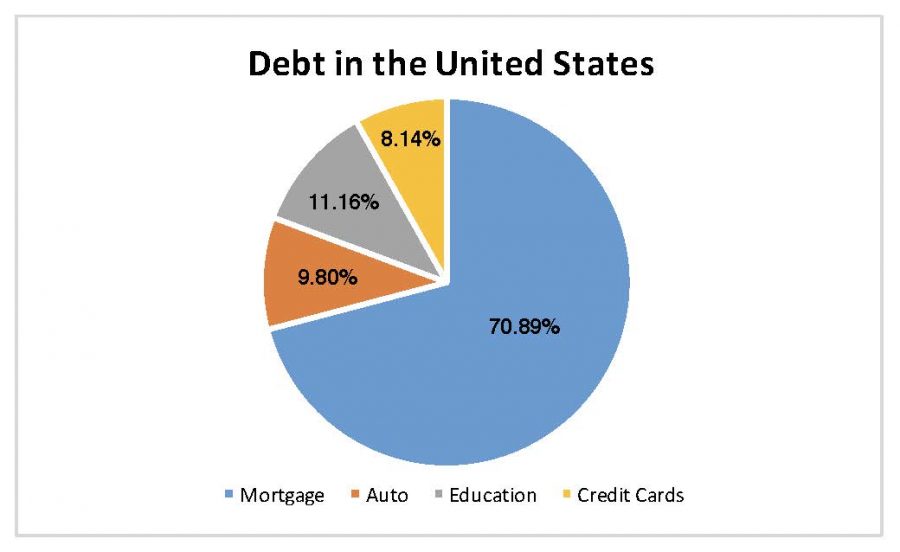Debt decision: What is career education really worth?
The second largest source of debt is student loans in the United States. Sources: Journal of Economic Literature, Debt.org, and Indeed.
March 13, 2020
Across the United States, youth are being convinced that the only way to lead a successful life is to go to a traditional four-year university, but is this really the only good choice? Many of these career discussions shy away from the alternative choices. These would include trade schools, vocational schools, military service, and startup businesses.
“[Student loan debt is] valued around $1.26 trillion and accounting for 10% of total household debt, [and] is the second largest source of household debt in the United States surpassed only by home mortgages,” economists Martin Gervais and Nicolas L. Ziebarth noted in a 2019 scholarly article This large debt can arguably be justified if it ensures that graduates have careers to help them repay the debt after college, but many college grads find themselves unemployed or not needing a college degree at all.
Debt.org currently estimates there is $1.48 trillion, making it slightly unclear exactly high the student debt climbed during 2019.
“53% of college graduates are unemployed or working in a job that doesn’t require a bachelor’s degree. It takes the average college graduate three to six months to secure employment after graduation,” the University of Washington reports.
With such a high rate of unemployment among college graduates, this begs the question: what else can the U.S. be encouraging youth to do?
According to the U.S. Bureau of Labor Statistics, trade jobs are predicted to have the highest employment growth out of all career types between 2018-2028. Some of the fields predicated to have an increase in employment opportunities are solar installers (+63%) and wind turbine technicians (+56.95%).
“Thirty percent of aircraft maintenance technicians nationwide have reached or are nearing retirement age, and only 2% of the workforce is new,” Forbes’ staff writer Carter Coudriet writes.
With the odds of college graduates being employed in careers requiring a college degree being less than 50%, it may be time to begin helping youth understand just how much many of the blue-collar careers are expected to grow.
The average annual salary for college graduates employed in their field during 2019 was $51,000 according to SHRM’s Stephan Miller.
With yearly tuition and fees for full-time students at CSU Bakersfield being $17,622, a four-year student without financial aid will pay $70,488 over their academic career. Even a full-time community college student at Bakersfield College will spend $7,224 per school year. Without financial aid, an associate’s degree would cost $28,896 for two years.
In comparison, Univstats lists the total tuition for Milan Institute as $19,753, and UEI College as $19,900. These programs are also designed for students to complete their program and be certificated, or licensed if applicable, in their field in less than two years.
Indeed.com lists the current average pay for solar installers at $19.60/hour, wind turbine technicians at $23.24/hour, and aircraft maintenance technicians at $23.10/hour. Cosmetologists currently have an average yearly salary of $44,167. At the average salary in each field, a full-time employee working 40 hours per week would make more money in a single year than their entire tuition cost to attend their respective schools.

Individuals must decide for themselves if the student debt is worth it after research. Sources: Journal of Economic Literature, Debt.org, and Indeed.
Teanna Hill, a local cosmetologist from Atomic Kitten salon, speaks highly of her experience attending a trade program and her time as a stylist afterward. She explains that she has loved having a career that she can enjoy while supporting her family. After sixteen years in the industry, she has learned to love it despite the challenges cosmos face.
“I was fortunate enough to go to beauty school with financial aid, so I graduated debt free. This is an industry that takes money and skill to make it. There are corporate salons that will educate and train new stylists. If you don’t have the money, they will help you,” Hill explains.
Other local business owners wish that they themselves had understood there were more options than just university, and now hope that today’s youth will know more about their options. Cesar Soto, owner of the popular Vatos Tacos, attended a traditional college prior to starting his business. After a year and a half in college as a criminal justice major, Soto concluded that just wasn’t for him.
“My parents just pushed us to be hard workers and be the best at what we do. I always dreamed of having my own business, and I’m living that dream right now,” Soto states.
However, skipping out on college doesn’t mean that the work is easy. Most of these jobs still require a distinct set of skills and education, typically provided during trade and/or vocational school, that take their fair share of practice to do well. Ulises Torres, a tattoo artist from Naked Al’s, is just one of many trade workers who can attest to how difficult the work can be.
“Tattooing isn’t a career I would want my child to get into. There’s a lot of competition. It takes practice, skill, and hard work. I would never give it up for anything, but I also feel like I earned it,” Torres admits.
Torres explains that the best career options are the ones that a person is truly passionate about. While he doesn’t dislike people who choose the career that provides the most stability, he does wonder what the point of life is if a person isn’t doing what makes them happy. “They’re missing the passion; they no longer choose to tattoo out of love.”
Having experienced missing weddings, funerals, and birthdays to get to where he is now, he recommends that job-seekers choose fields that are worth the sacrifices.
In the end, it’s important for people to keep in mind that they will likely maintain the same career for a long time. Whether a person chooses to attend a traditional university or go straight into the workforce, what ultimately matters is that the decision is made in a responsible, informed manner.







